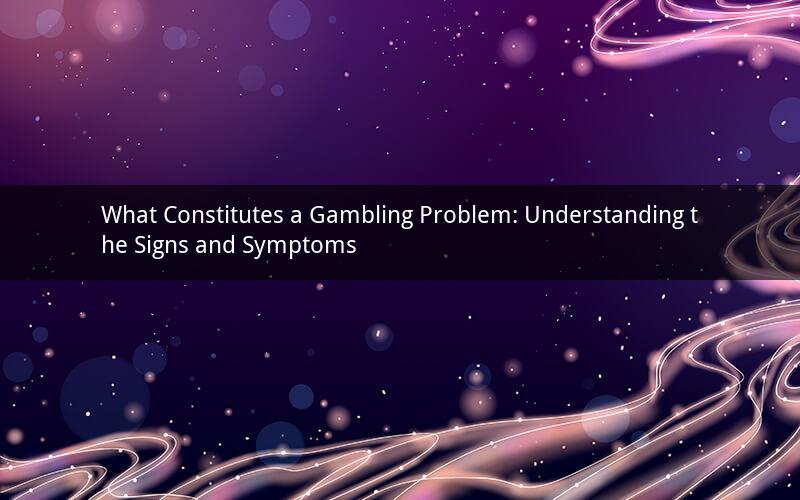
Gambling has become a prevalent activity in modern society, with countless individuals participating in various forms of betting and gaming. However, not all gamblers develop a gambling problem. So, what constitutes a gambling problem? This article aims to explore the signs and symptoms of a gambling problem, providing insights into how individuals can identify and seek help if needed.
1. Compulsive Gambling
Compulsive gambling, also known as problem gambling or gambling addiction, is characterized by an uncontrollable urge to gamble, despite the negative consequences it may bring. Individuals with a gambling problem often find themselves chasing losses, increasing the stakes, and spending more time and money on gambling activities than intended.
1.1. Chasing Losses
One of the most common signs of a gambling problem is the tendency to chase losses. This means that when a person loses money while gambling, they feel the urge to keep playing in the hope of recouping their losses. This behavior can lead to a dangerous cycle of debt and financial instability.
1.2. Increasing Stakes
Another sign of a gambling problem is the individual's increasing stakes to try and win back their losses or to experience the thrill of winning. This behavior can quickly escalate the amount of money spent on gambling and can lead to significant financial trouble.
1.3. Spending More Time and Money on Gambling
Gamblers with a problem often find themselves spending more time and money on gambling activities. This can interfere with their daily responsibilities, relationships, and overall well-being. It is essential to recognize when gambling is taking over one's life and seek help before it becomes unmanageable.
2. Negative Consequences
A gambling problem can have numerous negative consequences, both on an individual's personal and professional life. The following are some of the common consequences of a gambling problem:
2.1. Financial Problems
Gambling problems often lead to significant financial trouble. Individuals with a gambling problem may accumulate large debts, leading to stress, anxiety, and even bankruptcy.
2.2. Emotional and Psychological Issues
Gambling can cause emotional and psychological distress, including anxiety, depression, and feelings of guilt. These issues can further exacerbate the gambling problem and make it even more challenging to overcome.
2.3. Relationship Problems
Gambling can strain personal relationships, as individuals with a gambling problem may become distant, secretive, and unreliable. This can lead to conflicts and even the breakdown of relationships.
2.4. Professional Consequences
Gambling problems can also have a negative impact on an individual's professional life. Employees with a gambling problem may experience decreased productivity, increased absenteeism, and even job loss.
3. Identifying a Gambling Problem
Identifying a gambling problem can be challenging, as individuals may not always recognize the severity of their situation. However, there are several signs and symptoms that can help in recognizing a gambling problem:
3.1. Lying to Family and Friends
Individuals with a gambling problem may lie to family and friends about their gambling activities, either to hide their addiction or to borrow money for gambling.
3.2. Neglecting Responsibilities
Gamblers with a problem may neglect their responsibilities, such as work, school, and family, in favor of gambling activities.
3.3. Experiencing Guilt and Remorse
Individuals with a gambling problem may experience feelings of guilt and remorse after gambling, especially when they realize the negative consequences of their actions.
3.4. Attempting to Quit or Cut Back
Individuals with a gambling problem may have made unsuccessful attempts to quit or cut back on their gambling activities, indicating a strong urge to continue.
4. Seeking Help
If you or someone you know is struggling with a gambling problem, it is crucial to seek help. Here are some resources and steps to consider:
4.1. Professional Help
Seeking help from a mental health professional, such as a therapist or counselor, can be an effective way to address a gambling problem. These professionals can provide personalized treatment and support to help individuals overcome their addiction.
4.2. Support Groups
Support groups, such as Gamblers Anonymous, can offer a sense of community and understanding for individuals struggling with a gambling problem. These groups provide a safe space to share experiences and receive encouragement from others who have faced similar challenges.
4.3. Financial Counseling
Financial counseling can help individuals with a gambling problem manage their debt and develop healthier financial habits. This may involve creating a budget, seeking debt consolidation, or exploring other financial solutions.
4.4. Self-Reflection and Mindfulness
Practicing self-reflection and mindfulness can help individuals with a gambling problem become more aware of their triggers and develop healthier coping mechanisms. Techniques such as meditation, journaling, and mindfulness exercises can be beneficial in managing the urge to gamble.
Frequently Asked Questions:
Q1: How can I tell if I have a gambling problem?
A1: You may have a gambling problem if you experience a strong urge to gamble, despite negative consequences, and find it difficult to control your gambling behavior.
Q2: What are the signs of a gambling problem in a loved one?
A2: Signs of a gambling problem in a loved one may include lying about gambling, neglecting responsibilities, experiencing financial trouble, and showing signs of stress or anxiety.
Q3: Can a gambling problem be cured?
A3: While there is no one-size-fits-all solution for a gambling problem, it can be effectively managed and overcome with the right treatment and support.
Q4: Are there any treatments available for gambling problems?
A4: Yes, there are various treatments available for gambling problems, including therapy, support groups, and financial counseling.
Q5: Can a gambling problem affect my relationships?
A5: Yes, a gambling problem can significantly impact your relationships, as it can lead to financial trouble, emotional distress, and neglect of responsibilities. It is essential to address the problem to maintain healthy relationships.